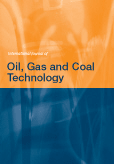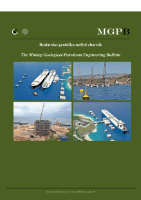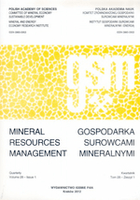
OIL SHALE
Scope & Guideline
Exploring Sustainable Solutions in Energy Engineering
Introduction
Aims and Scopes
- Exploration and Geochemical Analysis:
Research articles often delve into the geochemical characterization of various oil shale samples, providing insights into their composition, properties, and potential for energy production. - Pyrolysis and Thermal Processing:
A significant focus is on the pyrolysis processes of oil shale, including studies on kinetics, thermodynamic properties, and optimization of conditions to enhance oil recovery and reduce environmental impacts. - Environmental Impact and Sustainability:
The journal addresses the environmental implications of oil shale extraction and processing, discussing methodologies for reducing the ecological footprint and improving sustainability in oil shale operations. - Technological Innovations in Extraction:
Innovative techniques for in-situ conversion, co-pyrolysis with biomass, and other advanced extraction methods are frequently highlighted, showcasing the evolution of oil shale technologies. - Geological and Depositional Studies:
Research often explores the geological settings and depositional environments of oil shales, contributing to a better understanding of their formation and resource potential. - Resource Evaluation and Economic Analysis:
The journal includes studies on the economic viability and resource evaluation methods for oil shale deposits, aiding stakeholders in making informed decisions regarding investment and development.
Trending and Emerging
- In-situ Pyrolysis and Conversion Technologies:
An increasing number of studies are dedicated to in-situ pyrolysis methods, highlighting their potential advantages in reducing environmental impacts and improving energy efficiency in oil shale extraction. - Co-pyrolysis with Biomass:
Research exploring the co-pyrolysis of oil shale with biomass is on the rise, indicating a growing interest in sustainable energy solutions and the integration of renewable resources into oil shale processing. - Environmental Remediation and Waste Management:
There is a notable increase in studies focused on the environmental impacts of oil shale production and innovative waste management strategies, reflecting heightened awareness of sustainability issues. - Advanced Characterization Techniques:
Emerging themes include the application of advanced characterization techniques such as molecular modeling and numerical simulations, which offer deeper insights into the properties and behaviors of oil shale. - Resource Potential and Economic Viability:
Recent publications emphasize the assessment of resource potential and economic evaluations of oil shale, driven by market dynamics and the need for informed decision-making in resource management.
Declining or Waning
- Historical Environmental Assessments:
Papers focusing on historical environmental assessments related to oil shale mining have become less frequent, suggesting a shift towards more contemporary environmental impacts and mitigation strategies. - Basic Physical Properties Studies:
Research solely dedicated to basic physical properties of oil shales has seen a decline, possibly due to a growing emphasis on more complex interactions and applications related to oil shale processing. - Conventional Oil Shale Extraction Techniques:
There is a noticeable reduction in studies centered around traditional extraction techniques, as the field moves towards more innovative and efficient methods such as in-situ pyrolysis and co-processing.
Similar Journals

Journal of Oil Palm Research
Driving Research Excellence in Oil Palm Science and BeyondJournal of Oil Palm Research is a pivotal publication in the field of agricultural science, specifically focusing on the multifaceted aspects of oil palm cultivation, research advancements, and sustainability practices. Published by the MALAYSIAN PALM OIL BOARD, this journal serves as a significant platform for disseminating high-quality research and innovative solutions in oil palm agronomy, genetics, and socio-economic impacts, capturing the interest of researchers, industry professionals, and students alike. With an E-ISSN of 2811-4701, the journal is committed to presenting peer-reviewed articles that aim to enhance the understanding of oil palm's role in global agriculture and its contributions to environmental sustainability. The absence of a traditional access fee underscores its dedication to open access principles, fostering broader dissemination of knowledge. As the oil palm industry continues to evolve amidst environmental and market challenges, the Journal of Oil Palm Research remains essential for those dedicated to this field, offering insights that inform practice and policy.

International Journal of Oil Gas and Coal Technology
Transforming Energy Challenges into OpportunitiesWelcome to the International Journal of Oil Gas and Coal Technology, a key platform for research and innovation in the energy sector, published by INDERSCIENCE ENTERPRISES LTD. With an ISSN of 1753-3309 and an E-ISSN of 1753-3317, this journal has been serving the academic community since its inception in 2008, continuing through to 2024. Located in the heart of Geneva, Switzerland, this journal focuses on the essential fields of oil, gas, and coal technologies, addressing cutting-edge developments and challenges in energy production and sustainability. Although currently categorized in the fourth quartile in Energy (Miscellaneous) and holding a Scopus rank in the 26th percentile, the journal aims to enhance its visibility and impact through rigorous peer-reviewed research articles, critical reviews, and insightful case studies that are accessible to the global academic community. Researchers, professionals, and students alike will find valuable insights and advancements in energy technology that contribute to a sustainable future.

Economic and Environmental Geology
Unveiling Insights into Economic and Environmental DynamicsEconomic and Environmental Geology is a peer-reviewed journal published by the Korea Society for Economic & Environmental Geology, focusing on critical intersections within the fields of economic geology and environmental science. With an ISSN of 1225-7281 and an E-ISSN of 2288-7962, this journal serves as a vital platform for researchers, professionals, and students engaged in the comprehensive study of geological resources and their impacts on the environment. As of 2023, the journal is categorized in the Q4 quartile for both Economic Geology and Environmental Science, indicating its emergent impact in these domains. Despite being in the early stages of its convergence from 2017 to 2024, the journal holds importance for advancing knowledge and fostering discussions about sustainable geological practices in South Korea and beyond. The journal does not currently offer open-access options, but it continues to provide essential insights into the challenges and innovations within economic and environmental geology.

CT&F-Ciencia Tecnologia y Futuro
Fostering collaboration in geosciences and beyond.CT&F-Ciencia Tecnologia y Futuro, a distinguished open-access journal published by ECOPETROL SA, serves as a vital platform for the dissemination of innovative research and advancements in the fields of chemical engineering, energy, fuel technology, and the broader disciplines within the geosciences. Established in 1996 and operating continuously until 2023, this bilingual journal aims to foster collaboration and knowledge exchange among researchers, professionals, and students in Colombia and beyond. With an increasing emphasis on sustainability and renewable energy, CT&F aligns with contemporary academic priorities and societal challenges. Although currently ranked in the Q4 category across multiple disciplines, the journal remains committed to enhancing its impact and accessibility, providing researchers with valuable insights and a significant forum to share their findings, all under the auspices of open-access since 2009. Explore a wealth of research as you contribute to the ongoing dialogue shaping the future of science and technology.

Journal of Mining Institute
Shaping the Future of Mining and GeologyThe Journal of Mining Institute, published by SAINT-PETERSBURG MINING UNIVERSITY, stands as a premier platform for disseminating cutting-edge research in the fields of Economic Geology, Geology, and Geotechnical Engineering. With an impressive Q1 ranking in various quartiles for 2023, this journal offers enlightening insights into earth sciences, reflecting its substantial impact within the academic community. The journal, accessible in open access format since 1975, ensures that researchers, professionals, and students can readily access high-quality research articles. The ISSN for the print version is 2411-3336 and E-ISSN 2541-9404, supporting its reach both online and offline. As it converges knowledge from 2017 to 2024, the Journal of Mining Institute serves as an essential resource for understanding contemporary challenges and innovations in mining and geology, encouraging a collaborative exploration of sustainable practices and technological advancements in these critical fields.

Rudarsko-Geolosko-Naftni Zbornik
Navigating the Complexities of Earth's ResourcesRudarsko-Geolosko-Naftni Zbornik, the esteemed journal published by the University of Zagreb's Faculty of Mining, Geology and Petroleum Engineering, serves as a vital platform for advancing knowledge in the fields of Earth sciences, energy, and geology. With an ISSN of 0353-4529 and an E-ISSN of 1849-0409, this open-access journal has been disseminating high-quality research since 1989, contributing significantly to scientific discourse in Croatia and beyond. As of 2023, it holds an impressive categorization in various quartiles, notably achieving Q2 in Earth and Planetary Sciences and Q3 in several related domains, showcasing its relevance and impact within the academic community. The journal's commitment to quality is reflected in its Scopus rankings, placing it in competitive positions across diverse disciplines. Researchers, professionals, and students alike will find invaluable resources and insights that foster innovation and collaboration in their respective fields, making Rudarsko-Geolosko-Naftni Zbornik an essential read for those dedicated to exploring the complexities of natural resources and environmental challenges.

Gospodarka Surowcami Mineralnymi-Mineral Resources Management
Shaping the Dialogue on Mineral Resource UtilizationGospodarka Surowcami Mineralnymi-Mineral Resources Management is a pivotal academic journal published by the Polish Academy of Sciences and the Mineral and Energy Economics Research Institute. Focusing on the field of Economic Geology, this journal plays a critical role in disseminating research on mineral resources management, exploring the economic implications of mineral exploitation, sustainability practices, and technological advancements in resource extraction. With an ISSN of 0860-0953 and an E-ISSN of 2299-2324, the journal has established itself as a respected source of knowledge, holding a Q3 ranking in its category as of 2023 and demonstrating its relevance within a competitive landscape where it ranks 22nd out of 43 in Economic Geology according to Scopus. Researchers, professionals, and students will find this journal to be an invaluable resource for the latest insights and developments in mineral resource management, contributing significantly to the overarching conversations in geology and environmental science.

China Petroleum Processing & Petrochemical Technology
Fueling the future of energy engineering and chemical technology.China Petroleum Processing & Petrochemical Technology is a critical journal published by the China Petroleum Processing & Petrochemical Technology Press, focusing on the pivotal advancements within the field of petroleum processing and petrochemical technology. With ISSN 1008-6234, the journal has been a significant resource since its inception in 1999 and aims to disseminate original research articles, reviews, and case studies that contribute to knowledge and innovation in energy engineering, fuel technology, and chemical engineering. Despite its current Q4 status in various quartile rankings, it provides essential insights and research that are invaluable for researchers, professionals, and students interested in these expanding areas. The journal is located in Beijing, China, and continues to strive for excellence in academia, encouraging contributions that address pressing challenges in the petroleum and petrochemical industries while fostering a deeper understanding of process chemistry and technology.

PETROLEUM SCIENCE AND TECHNOLOGY
Bridging academia and industry in energy innovation.PETROLEUM SCIENCE AND TECHNOLOGY, published by Taylor & Francis Inc, is a pivotal journal dedicated to advancing the multidisciplinary field of petroleum engineering and related technologies. With an ISSN of 1091-6466 and an E-ISSN of 1532-2459, this journal serves as a vital platform for disseminating research in areas ranging from geotechnical engineering to energy technology. As of 2023, it is recognized in the Q3 quartile across several categories, including Chemical Engineering and Fuel Technology, signifying its respectable standing within the academic community. With a convergence timeline from 1997 to 2024, the journal continuously addresses crucial issues in the energy sector, making it essential reading for researchers, industry professionals, and policy-makers alike. Although not an open access journal, its rigorous peer-reviewed articles contribute significantly to the advancement of knowledge and innovation within these fields, reflecting the journal's commitment to promoting scientific understanding and practical applications.

Interpretation-A Journal of Subsurface Characterization
Elevating Understanding of Subsurface DynamicsInterpretation: A Journal of Subsurface Characterization is a premier academic journal dedicated to advancing the methodologies and technologies integral to the characterization of subsurface environments. Published by the Société de l'Exploration Geophysicists (SEG), this journal serves the fields of geology and geophysics, reflecting its critical role in the intersection of these domains. With an h-index that underscores its scholarly impact and its ranking in the Q2 category for both Geology and Geophysics, Interpretation is recognized for publishing high-quality, innovative research that offers valuable insights and solutions to contemporary challenges in subsurface exploration. Since its inception in 2013, the journal has quickly become essential reading for researchers, professionals, and students alike, providing open access to a wealth of knowledge fostering collaboration and advancement within the geoscience community. Featuring a comprehensive range of studies, methodologies, and reviews, Interpretation is integral for professionals striving to enhance their understanding of subsurface dynamics and impacting areas such as resource management, environmental conservation, and hazard assessment.